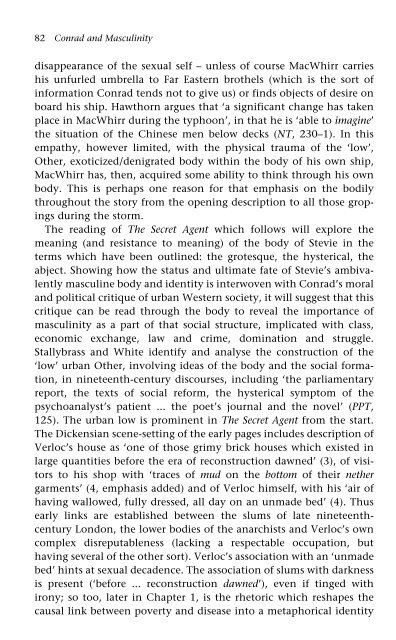Conrad and Masculinity
Conrad and Masculinity
Conrad and Masculinity
You also want an ePaper? Increase the reach of your titles
YUMPU automatically turns print PDFs into web optimized ePapers that Google loves.
82 <strong>Conrad</strong> <strong>and</strong> <strong>Masculinity</strong><br />
disappearance of the sexual self – unless of course MacWhirr carries<br />
his unfurled umbrella to Far Eastern brothels (which is the sort of<br />
information <strong>Conrad</strong> tends not to give us) or finds objects of desire on<br />
board his ship. Hawthorn argues that ‘a significant change has taken<br />
place in MacWhirr during the typhoon’, in that he is ‘able to imagine’<br />
the situation of the Chinese men below decks (NT, 230–1). In this<br />
empathy, however limited, with the physical trauma of the ‘low’,<br />
Other, exoticized/denigrated body within the body of his own ship,<br />
MacWhirr has, then, acquired some ability to think through his own<br />
body. This is perhaps one reason for that emphasis on the bodily<br />
throughout the story from the opening description to all those gropings<br />
during the storm.<br />
The reading of The Secret Agent which follows will explore the<br />
meaning (<strong>and</strong> resistance to meaning) of the body of Stevie in the<br />
terms which have been outlined: the grotesque, the hysterical, the<br />
abject. Showing how the status <strong>and</strong> ultimate fate of Stevie’s ambivalently<br />
masculine body <strong>and</strong> identity is interwoven with <strong>Conrad</strong>’s moral<br />
<strong>and</strong> political critique of urban Western society, it will suggest that this<br />
critique can be read through the body to reveal the importance of<br />
masculinity as a part of that social structure, implicated with class,<br />
economic exchange, law <strong>and</strong> crime, domination <strong>and</strong> struggle.<br />
Stallybrass <strong>and</strong> White identify <strong>and</strong> analyse the construction of the<br />
‘low’ urban Other, involving ideas of the body <strong>and</strong> the social formation,<br />
in nineteenth-century discourses, including ‘the parliamentary<br />
report, the texts of social reform, the hysterical symptom of the<br />
psychoanalyst’s patient ... the poet’s journal <strong>and</strong> the novel’ (PPT,<br />
125). The urban low is prominent in The Secret Agent from the start.<br />
The Dickensian scene-setting of the early pages includes description of<br />
Verloc’s house as ‘one of those grimy brick houses which existed in<br />
large quantities before the era of reconstruction dawned’ (3), of visitors<br />
to his shop with ‘traces of mud on the bottom of their nether<br />
garments’ (4, emphasis added) <strong>and</strong> of Verloc himself, with his ‘air of<br />
having wallowed, fully dressed, all day on an unmade bed’ (4). Thus<br />
early links are established between the slums of late nineteenthcentury<br />
London, the lower bodies of the anarchists <strong>and</strong> Verloc’s own<br />
complex disreputableness (lacking a respectable occupation, but<br />
having several of the other sort). Verloc’s association with an ‘unmade<br />
bed’ hints at sexual decadence. The association of slums with darkness<br />
is present (‘before ... reconstruction dawned’), even if tinged with<br />
irony; so too, later in Chapter 1, is the rhetoric which reshapes the<br />
causal link between poverty <strong>and</strong> disease into a metaphorical identity




